Cuba is getting a lot of attention lately – both as an exotic and, until 2015, off-limits place to visit freely, and currently as a place that may become off limits once again as the Trump administration brashly unravels all the political gains made over the past eight years.
As a true jewel in the Caribbean Cuba should be on every traveler’s bucket list. For the time being the most confident way to travel to Cuba is by cruise ship.
To that end, two of the most popular and well-known cruise lines recently received approval for sailings to Cuba – Carnival Cruise Line and Holland America Line, two of the 10 cruise brands that are part of Carnival Corporation, the world’s largest cruise company.
Carnival Corporation made history in May 2016 when its Fathom brand became the first cruise line to sail from the U.S. to Cuba in more than 40 years. So the company has had plenty of recent experience in sailing guests to Cuba – and fine-tuning how to provide their guests with a great experience.
HAL’s ms Veendam Heads to Cuba
And on June 29, history was again made as Carnival Cruise Line’s 2,052-passenger Carnival Paradise set sail from Tampa to Havana, becoming the largest U.S. cruise ship ever to sail from the U.S. to Cuba.
The cruise line is currently offering four- and five- day cruises starting this summer and fall that will overnight in Havana, giving guests the opportunity to immerse themselves in the city’s rich culture and history, as well as its vibrant nightlife. Five-day sailings also call at Key West or Cozumel.
On December 22, 2017 Holland America Line – widely recognized as a leader in the premium segment of the cruise industry – will become Carnival Corporation’s third cruise line to sail to Cuba.
Holland America Line’s 1,350-passenger ms Veendam will sail on seven-, 11- and 12-day itineraries during the 2017-2018 winter and spring seasons from Fort Lauderdale. The ship’s itineraries will visit Havana and some also call at Cienfuegos, known as Cuba’s “Pearl of the South,” which will include shore excursions to the stunningly preserved colonial city of Trinidad. Depending on the itinerary, passengers will also have opportunity to explore other ports of call in the Caribbean, including the Bahamas and Mexico.
Complicated Cuba Enjoyed the Easy Way
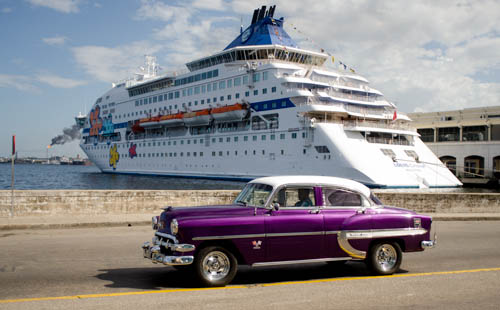
The opening of Cuba gives travelers a new, must-see destination to visit and explore in the Caribbean, the world’s most popular cruising region. The Spanish-speaking country is like no other place, filled with legendary history, culture and architecture, with people known for their work ethic, entrepreneurship and vibrant spirit for life.
Only 90 miles from the U.S., Cuba was for generations a place that U.S. travelers could only dream about visiting on a cruise ship. While the country is more accessible than ever by sea, it still feels like another world.
The opportunity to learn more about the Cuban culture directly from the Cuban people only enhances the experience of visiting Cuba. People-to-people exchanges, which meet U.S. guidelines for travel to Cuba, are arranged by the cruise lines on half-day and full-day shore excursions. After a complete day of exploration and immersion, guests can also experience nighttime shore excursions.
Global travelers and enrichment seekers are naturally curious about new destinations and places that are not easily visited. Cuba is one of these places, and Carnival Cruise Line and Holland America Line guests will find opportunities to learn about a country that most have only seen in photos and news reports.
“Many of the tours are designed in order to have our guests interact with small family-run operations to give them an authentic Cuban experience,” said Beth Bodensteiner, senior vice president of Revenue Management and Global Deployment for Holland America Line. “We have done all the legwork in creating meaningful experiences that meet all U.S. regulatory requirements. In our view, cruising is the best and most worry-free way to travel to Cuba, even more so going forward.”
Havana Calling
The sail-in through the narrow channel into Old Havana, with the beautiful, historically significant Morro Castle watching over the ship as it sails into the harbor is one of the highlights of any cruise to Cuba. Among the city’s stately buildings, passengers eye the Hotel Nacional, a landmark on the waterfront since 1930.
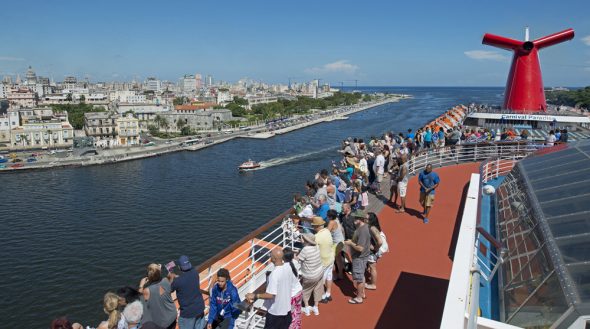
Old Havana, a UNESCO World Heritage site, is a jaw-dropping place to explore, a history-rich capital city with cobblestone streets, examples of baroque and neoclassical architecture, broad plazas and the impressive Malecón seawall on the Straits of Florida.
Cruise ships dock right in Old Havana, an easy walk to museums and other historical landmarks, such as La Bodeguita del Medio, where a scribble on the wall is attributed to Ernest Hemingway.
Visitors immerse in this time capsule of a city that is home to two million people and sense they are breathing history.
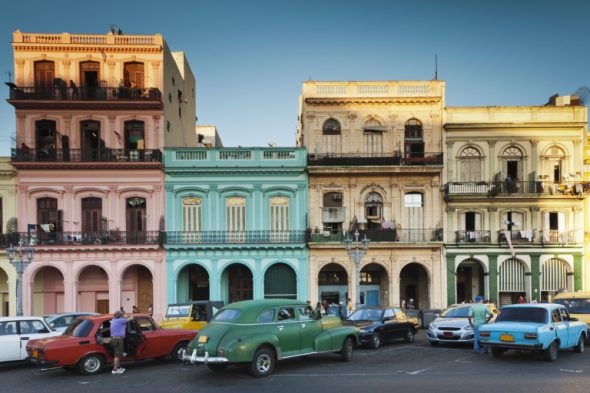
Cienfuegos and Trinidad
On Holland America Line cruises, guests have the additional opportunity to see the sophisticated neoclassical buildings of Cienfuegos, a port city carefully planned out by French settlers in the 19th century. Book an excursion to Trinidad and you will drive about 60 miles through the countryside to a beautifully preserved Spanish colonial city of cobblestone streets, palaces and plazas, founded in 1514 by the conquistador Diego Velázquez and located on a hilltop overlooking the Caribbean. Both Cienfuegos and Trinidad were significant trading capitals that like Old Havana are recognized as UNESCO World Heritage sites.
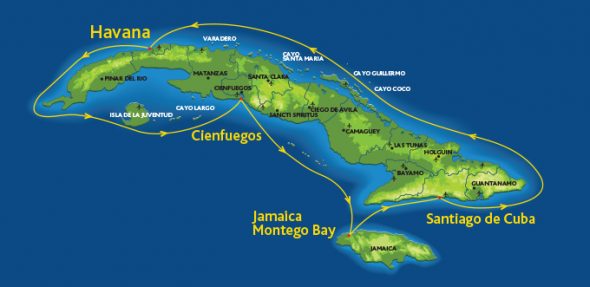
Tips for Cuba Cruise Travel
While U.S. residents are free (for the moment) to travel to Cuba, they still need to do so under certain regulations established by the U.S. government. Here are some things to know about traveling to Cuba:
Required paperwork. All U.S. citizens and most international travelers must have a valid passport. All guests are required to obtain a visa in order to enter Cuba. The type of visa that a guest will need will depend on certain factors, including the reason for travel to Cuba. Most guests will be able to enter Cuba utilizing a “Tarjeta Turistica” (or tourist card) visa. Guests will be able to purchase the “Tarjeta Turistica” from the cruise line at a cost of $75 per person. The visa is distributed at the time of boarding your ship. You can alternatively obtain a visa from the Cuban consulate or a visa service, but going through your cruise line is a major benefit.
Health fee. The Cuban government requires all guests to purchase health insurance, which will be automatically included in your port charges.
Shore excursions. Shore excursions offered by Carnival Cruise Line and Holland America Line meet the people-to-people educational activities requirement. Both lines offer a wide range of shore excursions.
Money matters. ATM debit and credit cards may not work in Cuba. Visitors should plan on bringing cash for any purchases. Pending any updated U.S. Department of Treasury rules, U.S. dollars can currently be exchanged for Cuban Convertible Pesos (CUCs). There is an exchange office at the Havana cruise terminal. The transaction fee for converting U.S. dollars to CUCs is approximately 10%.
Staying connected. Wi-Fi in Cuba requires the use of cards with codes. Travelers are best off sharing experiences by using the ship’s Internet access. Otherwise, they can check with their mobile provider regarding service and fees.
Related Stories:

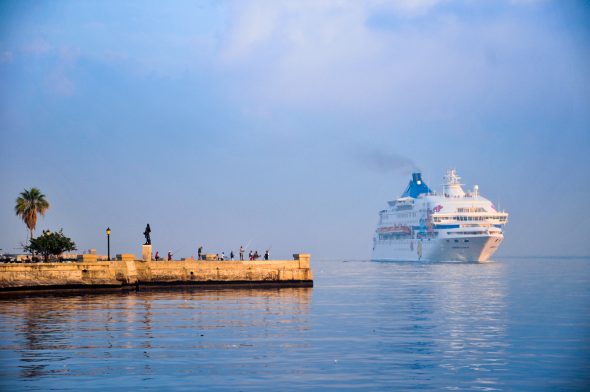






























































































































































































































































































Get Social